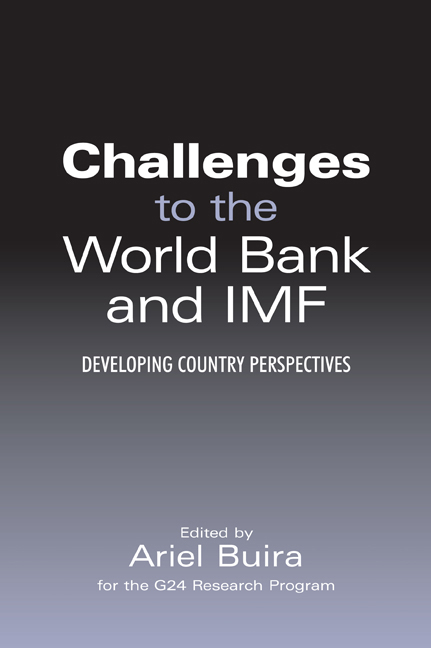Book contents
- Frontmatter
- Contents
- Contributors to this volume
- Foreword
- Introduction
- 1 The Governance of the IMF in a Global Economy
- 2 Who pays for the IMF?
- 3 An Analysis of IMF Conditionality
- 4 Achieving Long-Term Debt Sustainability in Heavily Indebted Poor Countries (HIPCs)
- 5 The Poverty Reduction Strategy Paper Approach: Good Marketing or Good Policy?
- 6 Capital Management Techniques in Developing Countries
- 7 International Reserves to Short-Term External Debt as an Indicator of External Vulnerability: The Experience of Mexico and Other Emerging Economies
- 8 Mechanisms for Dialogue and Debt-Crisis Workout that Can Strengthen Sovereign Lending to Developing Countries
- 9 Developing a Global Partnership for Development
- 10 International Financial Institutions and International Public Goods: Operational Implications for the World Bank
- Index
10 - International Financial Institutions and International Public Goods: Operational Implications for the World Bank
Published online by Cambridge University Press: 10 September 2020
- Frontmatter
- Contents
- Contributors to this volume
- Foreword
- Introduction
- 1 The Governance of the IMF in a Global Economy
- 2 Who pays for the IMF?
- 3 An Analysis of IMF Conditionality
- 4 Achieving Long-Term Debt Sustainability in Heavily Indebted Poor Countries (HIPCs)
- 5 The Poverty Reduction Strategy Paper Approach: Good Marketing or Good Policy?
- 6 Capital Management Techniques in Developing Countries
- 7 International Reserves to Short-Term External Debt as an Indicator of External Vulnerability: The Experience of Mexico and Other Emerging Economies
- 8 Mechanisms for Dialogue and Debt-Crisis Workout that Can Strengthen Sovereign Lending to Developing Countries
- 9 Developing a Global Partnership for Development
- 10 International Financial Institutions and International Public Goods: Operational Implications for the World Bank
- Index
Summary
Abstract
The global international financial institutions (IFIs) increasingly justify their operations in terms of the provision of international public goods (IPGs). This is partly because the rich countries of the North appear to support expenditures on these IPGs, in contrast to the ‘aid fatigue’ that afflicts the channeling of country-specific assistance. But do the IFIs necessarily have to be involved in the provision of IPGs? If they do, what are the terms and conditions of that engagement? How does current practice compare to the ideal? And what reforms are needed to move us closer to the ideal? These are the questions I ask in the framework of the theory of international public goods, and in light of the practice of international financial institutions, the World Bank in particular. For the World Bank, I draw a series of specific operational and resource reallocation implications.
1. Introduction
When people talk of the international financial institutions (IFIs), they usually mean the two Bretton Woods institutions, the International Monetary Fund and the World Bank. Of course, strictly speaking, any multilateral organization with financial operations is an IFI – for example, the regional multilateral banks, regional monetary authorities or some agencies of the UN that disburse funding. However, in practice, the term IFIs is understood to mean the two global IFIs – the Fund and the Bank. In recent years there has been growing discussion of the role of these institutions in the provision of international public goods (IPGs). An aid-fatigued public in the rich North, beset by its own internal budgetary problems (for example, the looming social security crisis associated with an aging population) and convinced by tales of waste and corruption in aid flows, has grown weary and wary of conventional country-specific development assistance. In contrast, the notion of IPGs seems attractive to Northern publics – at least, their representatives have adopted the IPG refrain in international fora.
But what exactly is an IPG? Given the ‘aura’ that the term seems to have developed, there is clearly an incentive to justify any activity by any agency as an IPG, and aid agencies have not been shy in doing this. At its most general level, development in poor countries is being defined as an IPG, and hence an argument for continuing conventional aid – disenchantment with which turned the Northern public to IPGs in the first place.
- Type
- Chapter
- Information
- Challenges to the World Bank and IMFDeveloping Country Perspectives, pp. 251 - 266Publisher: Anthem PressPrint publication year: 2003

